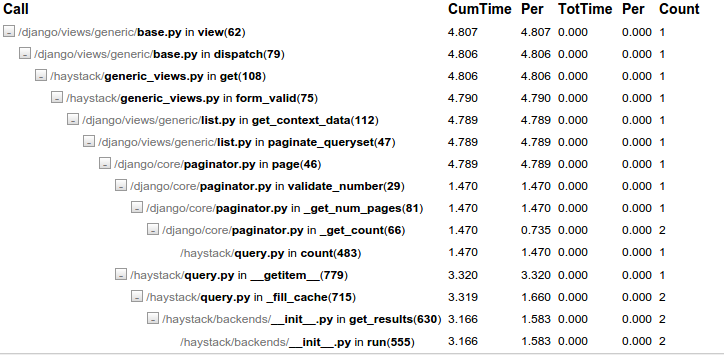I have a simple setup with django-haystack and whoosh engine. A search yielding 19 objects took me 8 seconds. I used the django-debug-toolbar to determine that i had a bunch of repeated queries.
I then updated my search view to prefetch relations, so that duplicate queries would not happen:
class MySearchView(SearchView):
template_name = 'search_results.html'
form_class = SearchForm
queryset = RelatedSearchQuerySet().load_all().load_all_queryset(
models.Customer, models.Customer.objects.all().select_related('customer_number').prefetch_related(
'keywords'
)
).load_all_queryset(
models.Contact, models.Contact.objects.all().select_related('customer')
).load_all_queryset(
models.Account, models.Account.objects.all().select_related(
'customer', 'account_number', 'main_contact', 'main_contact__customer'
)
).load_all_queryset(
models.Invoice, models.Invoice.objects.all().select_related(
'customer', 'end_customer', 'customer__original', 'end_customer__original', 'quote_number', 'invoice_number'
)
).load_all_queryset(
models.File, models.File.objects.all().select_related('file_number', 'customer').prefetch_related(
'keywords'
)
).load_all_queryset(
models.Import, models.Import.objects.all().select_related('import_number', 'customer').prefetch_related(
'keywords'
)
).load_all_queryset(
models.Event, models.Event.objects.all().prefetch_related('customers', 'contracts', 'accounts', 'keywords')
)
But even then, the search still takes 5 seconds. I then used the profiler from django-debug-toolbar, which gave me this information:
From what I can tell, the issue lies in haystack/query:779::__getitem__, which is hit twice, each costing 1.5 seconds. I have glanced through the code in question, but cannot make sense of it. So where do I go from here?


__getitem__triggers 2 queries to the database. Take a look on_fill_cache, it callsget_resultstwice which takes about 3 seconds overall. Are you sure that all items have been prefetched from the database? – Specialty